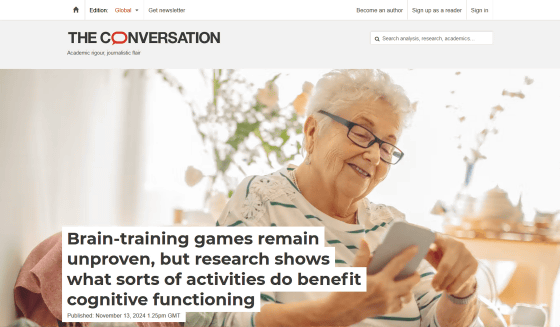Are there any benefits to 'brain training games'? What activities are good for the brain?

As we age, we may have experienced cognitive decline, such as forgetfulness or the time it takes to solve problems. Some people try to improve their cognitive function by playing '
Brain-training games remain unproven, but research shows what sorts of activities do benefit cognitive functioning
https://theconversation.com/brain-training-games-remain-unproven-but-research-shows-what-sorts-of-activities-do-benefit-cognitive-functioning-240499

Although cognitive decline is natural as we age, numerous studies have shown that people can slow or reverse the decline. There are a variety of activities that can improve cognitive function, one of which is 'brain training games/apps.'
Brain Training gamifies tests designed to measure cognitive function and is designed to help users master specific cognitive tasks, such as quickly finding the right combination of letters and numbers, quickly determining if a word has an even or odd number of letters, or identifying whether a letter is a vowel or consonant.
The games have time limits and multiple difficulty levels, so users can increase the difficulty according to their own skills. The manufacturers claim that playing these brain training games will improve attention, memory, information processing speed, and cognitive functions known as executive functions .
However, even if brain training improves skills in a particular task, it does not necessarily apply to real-world situations, and psychologists continue to debate whether brain training achieves lasting cognitive improvements. In 2016, the US Federal Trade Commission (FTC) fined the developer of the brain training app ' Lumosity ' $2 million (approximately 240 million yen at the time) for 'lack of scientific evidence.' In addition, in 2017, a research result was reported that Lumosity has no effect on improving the brain's cognitive abilities.
It turns out that the brain training app 'Lumosity' has no effect on strengthening brain function - GIGAZINE

While the effectiveness of brain training games is not well understood, a study in which McDonough participated , the Synapse Project , has identified types of 'activities that help improve cognitive function.'
In the Synapse project, participants were split into groups and assigned different types of activities. One group was asked to try new activities that they had little experience with, such as photography and embroidery. These activities were not games, but were engaging, challenging, and involved social interaction.
The other groups were assigned to 'socially interactive but non-novel activities,' such as traveling or cooking, or 'more solitary but non-novel activities,' such as crossword puzzles or listening to music. Each group met for 15 hours per week for 14 weeks to complete their respective activities, and cognitive function was measured at the start and end of the study.
As a result, people assigned to new and challenging activities showed greater improvements in cognitive functions such as memory, information processing speed, and reasoning ability compared to those assigned to easier activities. Because the subjects were not directly trained in the cognitive function measurement tests, it is suggested that the challenging activities improved skills such as 'memorizing lists of words' and 'solving abstract problems.' Furthermore, brain scans of the subjects revealed that the brains of people engaged in more challenging activities showed improved brain efficiency in terms of attention and information processing.
The difference between the Synapse Project and conventional brain training is whether the activity is performed in a group or alone. However, in the Synapse Project, there was no difference in the social nature of the activity between groups engaged in activities that were not new. In other words, McDonough and his colleagues say that it was 'new activities' rather than social factors that drove cognitive function and brain health.

Engaging in a new activity requires cognitive effort and can sometimes be frustrating. However, it stimulates the frontal lobe , which is responsible for thinking and judgment, and the parietal lobe , which processes attention and combines sensory input, which is thought to lead to improved cognitive function. In that sense, playing brain training games that are unfamiliar to you may improve your cognitive function.
Research has also shown that games other than brain training, such as Tetris , real-time strategy games , and action games, can also improve cognitive function.
It turns out that people who often play action games have high 'attention' and 'cognitive ability', and the era in which elites are trained through games may arrive - GIGAZINE

Related Posts:






